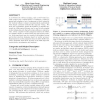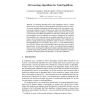453 search results - page 19 / 91 » Information Theory, Inference, and Learning Algorithms |
SIGIR
2012
ACM
11 years 10 months ago
2012
ACM
In crowdsourced relevance judging, each crowd worker typically judges only a small number of examples, yielding a sparse and imbalanced set of judgments in which relatively few wo...
SAGT
2010
Springer
13 years 6 months ago
2010
Springer
Can learning algorithms find a Nash equilibrium? This is a natural question for several reasons. Learning algorithms resemble the behavior of players in many naturally arising gam...
BVAI
2007
Springer
14 years 2 months ago
2007
Springer
We tested the efficiency of category learning when participants are provided only with pairs of objects, known to belong either to the same class (Positive Equivalence Constraints ...
JMLR
2010
13 years 2 months ago
2010
Round-based games are an instance of discrete planning problems. Some of the best contemporary game tree search algorithms use random roll-outs as data. Relying on a good policy, ...
ICDM
2002
IEEE
14 years 26 days ago
2002
IEEE
Current Data Mining techniques usually do not have a mechanism to automatically infer semantic features inherent in the data being “mined”. The semantics are either injected i...


